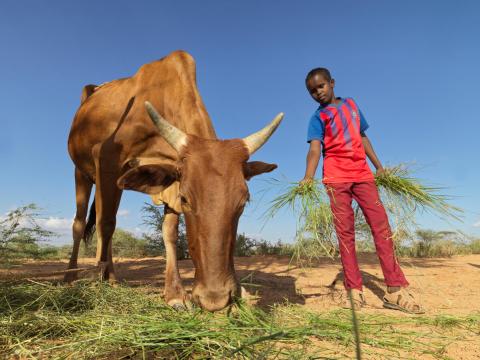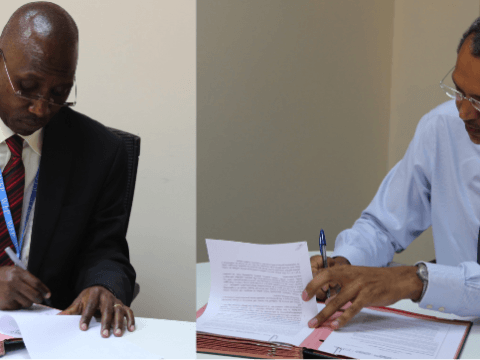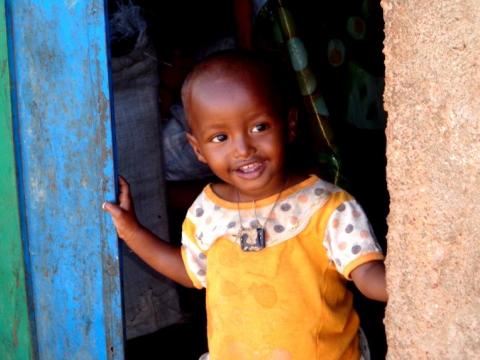
Future-proofing the lives of children in Somaliland through nature based solutions
Ibrahim Muse describes the importance of Farmer Managed Natural Regeneration (FMNR) and how it is improving the lives of children in Somaliland.
World Vision continues to champion its pioneering, low-cost land restoration techniques, known as Farmer-Managed Natural Regeneration (FMNR). Since 2017, when World Vision Australia started funding the program in Somaliland, FMNR techniques having proven helpful to local farmers by protecting communities from the severest effects of drought. These include restoring their own degraded land and managing their natural resources. These practices include how to cut and harvest grass sustainably, improve soil fertility, beekeeping, groundwater recharging, and regreening of landscapes through tree-planting. Armed with these invaluable techniques,
In one community, farmer groups practising FMNR in Somaliland had fodder for their animals even in the driest periods, ensuring good health and nutrition conditions of their livestock. This knowledge also improved livestock productivity and milk yields, giving them greater resilience during the periods of drought.
Community groups that practiced FMNR techniques earned a liveable income through the sale of hay and beekeeping. During the 2022 Deyr season (the ‘second’ rainy season from October to December) an established FMNR group consisting of 46 families, earned US$4,500 in income by harvesting about 900 bundles of hay from their communal site. The income enabled the community to meet their household basic needs: food, school fees, and health expenses.
Ismael’s story
Ismael and his mum, Muna, cut grass together in World Vision’s FMNR project site. Here, with training from World Vision staff, families learn how to cultivate and harvest grass sustainably. Ismael comes every day with his mother to help cut grass for their cows.
“Usually when I come here with my mum, it makes me happy because I’m helping her,” says Ismael, sweating a little bit under the hot sun in a remote village of Somaliland where the drought is still present. “My mum teaches me how to do this work, and it is shaping me to become a strong man. Now I’m young, but I’m getting older and my mum is preparing me for work.”
The 15-year-old is serious about his grass-cutting duties and loves to help when he is not in class. Ismael feels especially bound to this responsibility, as the severe drought has closed his school; the community was no longer able to sustain the additional resources required to continue running it. From a young age, children here come face-to-face with more than just their beloved animals dying, the reality of life in drought affects every element of their formative years.
“It really hurts me when I see a very weak cow. First of all, we can’t sell the milk; we can’t sell the cow. It makes me feel bad,” explains Ismael, as he feeds his two remaining cows. The other two died from starvation some time ago.
“I’ve seen many different animals that have died due to the drought and that gave me a bad feeling in my heart. One of our camels died. One day, when I tried to bring one home, I saw it wasn’t moving. I was shocked and I called my family, and they tried their best to help the camel stand up, but they couldn’t. In the end, it died…That was a bad memory.”
Inside World Vision’s regenerated area, families learn drought-resistant practices and grow tomatoes and onions from a nursery. However, the project’s key element remains the cultivation of grass, which many families depend on as their livestock are vital for their daily needs.
“If these cows didn’t get grass from this project, it would be hard for them to survive,” continues Ismael. “Before we didn’t have grass; we used to travel to far places. But now this project supports us a lot and helps our livestock survive.”
Before sunset, Ismael packs a final sack of grass and starts heading back home. “This area of grass is very meaningful for our family and for the animals.”
Ibrahim Mohamed Muse is World Vision ‘s Food Security and Livelihoods manager for programmes in Somaliland. With expertise over 12 years in areas including environment and climate change, Food security resilience and rural development. Ibrahim is a certified FMNR expert and holds a Master’s Degree in Climate Change and Environmental Sustainability, and a Bachelor’s Degree in Community Development.
Learn more about World Vision at COP28

